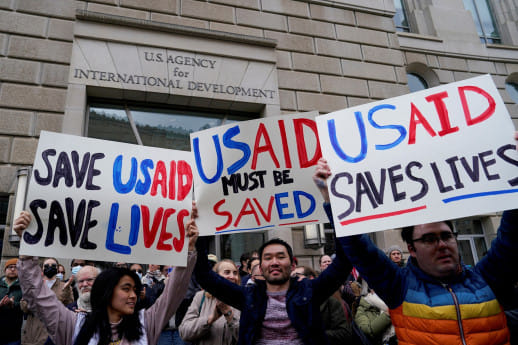Impact of USAID programme freeze on Bangladesh

The abrupt decision by the Trump administration to freeze almost all USAID operations globally has surprised millions of vulnerable people around the world, including in Bangladesh. In an unprecedented move, the White House issued an executive order on January 20 to temporarily suspend USAID's operations in over 100 countries worldwide to enhance efficiency and align with US foreign policy. The executive order has imposed a 90-day pause on US foreign development assistance, stating: "It is the policy of the United States that no further United States foreign assistance shall be disbursed in a manner that is not fully aligned with the foreign policy of the President of the United States."
USAID has a long history spanning six and a half decades. The organisation was created immediately after the Foreign Assistance Act of 1961 was signed into law by President John F Kennedy. The United States has been the world's largest donor, disbursing about $65 billion in official development assistance in 2023. Yet, US foreign assistance constitutes less than one percent of its budget, which is lower than that of some other countries. US official development assistance accounts for about 0.24 percent of its total gross national income (GNI). Most donor countries provide aid below the United Nations' ODA target of 0.7 percent of GNI.
Donor fund management is a complex task, and USAID executes it through its offices worldwide, managing thousands of contracts and agreements with international and national NGOs, government agencies, and the private sector. In 2023, USAID provided assistance to about 130 countries. The 10 largest recipient countries were Ukraine, Ethiopia, Jordan, Congo, Somalia, Yemen, Afghanistan, Nigeria, South Sudan, and Syria. Most of the nearly 10,000 employees of the agency worldwide have been placed on leave due to the executive order issued on January 20, except for those engaged in critical functions, core leadership responsibilities, and specially designated programmes.
USAID is now dealing with the aftermath of a sudden suspension of operations at the start of Trump's second term in office. President Trump was already interested in overhauling the organisation during his first term. Between 2017 and 2021, he repeatedly attempted to cut US development assistance and, in fact, reduced funding for programmes related to reproductive health and climate change. This time, the president and his advisers are likely to implement far-reaching reforms in the US aid system.
There is growing concern among USAID recipient countries about the fate of ongoing projects and the people employed in them. I have had the privilege of managing USAID funds in Bangladesh for about a decade—funds utilised by the government and two dozen NGOs to support the establishment of human, legal, land, water, employment, and other rights for disadvantaged people. Thus, I can confidently say that there is no doubt that those employed in these programmes will be directly affected by the US government's decision to freeze USAID funds. Additionally, beneficiaries of these NGO programmes will also be significantly impacted. I managed USAID programmes for government institutions, which facilitated upstream policy, governance, electoral and legal reforms, and health and family planning initiatives to create capacity and enabling conditions for inclusive development and equal opportunities for disadvantaged people.
The discontinuation of USAID-funded projects will have several consequences, as the future of these programmes and their funding is now uncertain. Those working on these projects will likely face frustration, as many may not be able to wait for a resolution and will struggle to find alternative employment. More than 100 projects were being implemented with USAID funds in Bangladesh, with a total value of $200 million across various sectors, including health, agriculture, environment, good governance, and social and economic opportunity. According to a news report published in The Daily Star on January 26, USAID issued a letter directing all implementing partners in Bangladesh to stop, cease, and/or suspend all USAID-funded project activities immediately. However, the directive thankfully excludes aid support for the Rohingya relief programme, for which USAID pledged $121 million.
A globally reputed organisation that will be adversely affected by USAID's suspension of operations in Bangladesh is the International Centre for Diarrhoeal Disease Research, Bangladesh (icddr,b). The suspension order has rendered the jobs of over a thousand icddr,b officials and employees uncertain, as they have already received termination letters. As USAID undergoes restructuring over the next three months, organisations like this should be given priority due to their critical role in delivering life-saving health interventions for thousands of children and women every month.
The US deserves credit for providing 40 percent of the world's humanitarian assistance. At the same time, there is a need to periodically assess the effectiveness of the over $40 billion the US spends annually on development aid. However, such assessments could have been conducted while the aid agency remained operational. Since the government has already decided to pause USAID's operations, we hope that it has a solid plan to ensure that the many valuable contributions of USAID are not lost in the process of making the organisation more efficient and effective.
Dr Nawshad Ahmed is an economist and urban planner.
Views expressed in this article are the author's own.
Follow The Daily Star Opinion on Facebook for the latest opinions, commentaries and analyses by experts and professionals. To contribute your article or letter to The Daily Star Opinion, see our guidelines for submission.




 For all latest news, follow The Daily Star's Google News channel.
For all latest news, follow The Daily Star's Google News channel. 

Comments